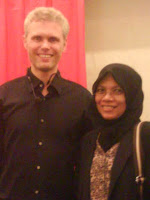Something to know and to be alert ...learning vocabulary is always fun if you let yourself explore the meaning and knowing these 4 subtances here:-
PREFIXES, SUFFIXES, ROOTS, AND CONFUSING WORDS OF ENGLISH VOCABULARy_______________________________________________________Prefixes are added to the beginning of words to change their meaning. Three common prefixes are dis-, mis-, and un-. The prefix a and an mean not or without. The related study-words are
1. amoral and apathy.
(without sensation) (without a sense of moral responsibility) (not cuttable)2. ab, abs, a [from, away] abnormal, abduct, absent, avert
(turn away)3.
il, ir, in, im [not]
illegal, irregular, incorrect, immoral
4.
in, il, im [into] [beneath]
inject, inside, illuminate, illustrate, impose, implant, imprison,infra, infrared5. un [not, release]
unfair, unnatural, unbutton
6.under [beneath]
underground, underlying
7. uni [one] unicycle, uniform, unify, universe, unique
(one of a kind)
8. vice [in place of]
vice president, vice admiral, viceroy________________________________________________________Suffixes are used with base words to form new words. For example, the words derived from “develop” include develops, developed, development, developing, and developer.
1.
able, ible [able, can do] capable, agreeable, edible, visible
(can be seen)2.
ize [make] emphasize, publicize, idolize
3.
less [without] baseless, careless, artless, fearless, helpless
(without care)
4.
ly [like, manner of]
carelessly, fearlessly, hopelessly, shamelessly
5.
ment [act of, state of, result ] contentment, amendment
state of amending
6.
[state of]
carelessness, restlessness__________________________________________________ROOTSThe root of a word is its basic form. For example, the root “port” means carry. Knowing this helps to learn the spelling and meaning of such words as portage, import, export, report, porter, deport, portable, comportment, and portfolio.
1.
sequ, secu, sue [follow] sequence, sequel, consequence, subsequent, prosecute, consecutive (following of one thing after another)
2.
serv [save, serve] servant, service, subservient, servitude, preserve, conserve, reservation, deserve, conservation, observe
3.
sign, signi [sign, mark, seal] signal, signature, design, insignia, significant (a gesture or sign to call attention) (the mark of a person written in his own handwriting) (distinguishing marks)
4.
simil, simul [like, resembling]
similar, assimilate, simile, simulate (resembling in many respects) (to make similar to) (pretend; put on an act to make a certain impression)
5.
sist, sta, stit [stand] assist, persist, circumstance, stamina, status, state, static, stable, stationary, substitute (to stand by with help)
(stand firmly; unyielding; continue) (power to withstand; to endure) (standing) (to stand in for another)
6.
solus [alone]
solo, soliloquy, solitaire, solitude
___________________________________________________
This course clears up
confusion about many words in the English language. It teaches students to spell and use different words that have the same pronunciation but different spelling. It also teaches the usage of words that have the same spelling but sounds different.
1. can, may- Can suggests ability while may suggests permission.
2. capital, capitol- The noun capital refers to a city or to money. The adjective capital means “major or important.” Capitol refers to a building.
3. cent, sent, scent- Cent is a coin; sent is the past tense of the verb send; scent is an odor or a smell.
4. chord, cord- Chord may mean “an emotion or feeling,” but it also may mean “the combination of two or more tones sounded at the same time, as with a guitar chord. A cord is a string or rope.
5. chose, choose- Chose (choz) is the past tense of the verb choose (chooz).












